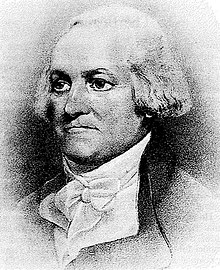“They all to a Man refus’d taking the Oath”
William Molineux refused to pay the £6 fine the Massachusetts Superior Court imposed on him for refusing jury duty in the fall of 1773.
Publicly, that was because Molineux was protesting how Chief Justice Peter Oliver accepted (or at that point not denying that he would accept) a salary from the Crown rather than the people of Massachusetts.
Privately, Molineux might have had another reason: he was in debt to Boston for £300 for money advanced for a public-works venture.
In February 1774, as the Massachusetts General Court moved to impeach Oliver, the merchant petitioned that legislature to block this fine on his behalf. The assembly declined to take action for Molineux alone.
On 28 July, Gov. Thomas Gage wrote to Chief Justice Oliver from Salem about how Molineux had still not paid his fine for refusing jury duty. He promised to support the judges if they demanded that £6 and threatened to jail the merchant.
But in August 1774 Parliament’s new Massachusetts Government Act made even more people refuse to cooperate with the court system under Oliver.
In the western counties, popular protest took the form of hundreds of men massing around the courthouses and keeping the justices out.
Bostonians didn’t dare to do that since their streets were once again patrolled by redcoat soldiers. So on 30 August they emulated Molineux’s refusal.
William Tudor (shown above later in life) wrote to his mentor in the law, John Adams, on 3 September:
In different ways the grand and petit jurors pointed to these reasons:
TOMORROW: The last court session.
Publicly, that was because Molineux was protesting how Chief Justice Peter Oliver accepted (or at that point not denying that he would accept) a salary from the Crown rather than the people of Massachusetts.
Privately, Molineux might have had another reason: he was in debt to Boston for £300 for money advanced for a public-works venture.
In February 1774, as the Massachusetts General Court moved to impeach Oliver, the merchant petitioned that legislature to block this fine on his behalf. The assembly declined to take action for Molineux alone.
On 28 July, Gov. Thomas Gage wrote to Chief Justice Oliver from Salem about how Molineux had still not paid his fine for refusing jury duty. He promised to support the judges if they demanded that £6 and threatened to jail the merchant.
But in August 1774 Parliament’s new Massachusetts Government Act made even more people refuse to cooperate with the court system under Oliver.
In the western counties, popular protest took the form of hundreds of men massing around the courthouses and keeping the justices out.
Bostonians didn’t dare to do that since their streets were once again patrolled by redcoat soldiers. So on 30 August they emulated Molineux’s refusal.
William Tudor (shown above later in life) wrote to his mentor in the law, John Adams, on 3 September:
Tuesday the Superior Court opened and Mr. Oliver took his Seat as chief Justice. When the grand Jury were called upon to be sworn they all to a Man refus’d taking the Oath, for Reasons committed to Paper, which they permitted the Court, after some Altercation, to read.The jurors’ protests were also published as handbills by Edes and Gill. Among the grand jurors were longtime activists Thomas Crafts and Paul Revere, John Hancock’s younger brother Ebenezer, and William Thompson, whose granddaughter supplied the texts to the Massachusetts Historical Society in 1875.
The Petit Jury unanimously followed the Example of the Grand Jury; their Reasons together with the others You will read in the Masstts. Spy.
In different ways the grand and petit jurors pointed to these reasons:
- The General Court had impeached Chief Justice Oliver.
- The Massachusetts Government Act had taken control of the courts from the people and put them under the Crown.
- Justices Oliver, Foster Hutchinson, and William Browne had accepted seats on the Council, now appointed under the new law instead of elected by the legislature as the charter specified.
TOMORROW: The last court session.


No comments:
Post a Comment